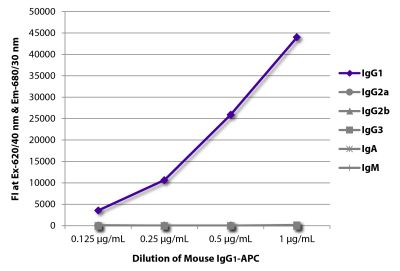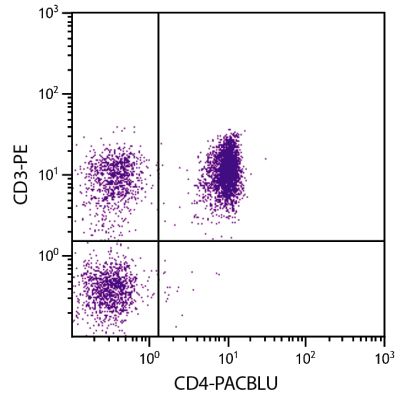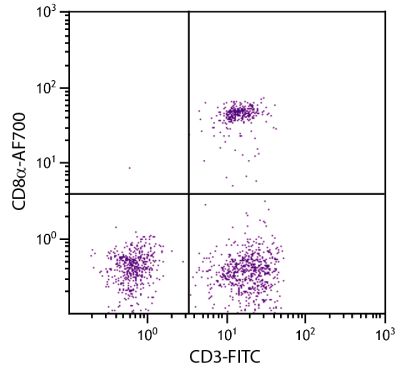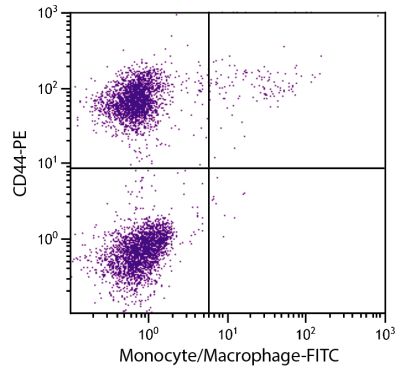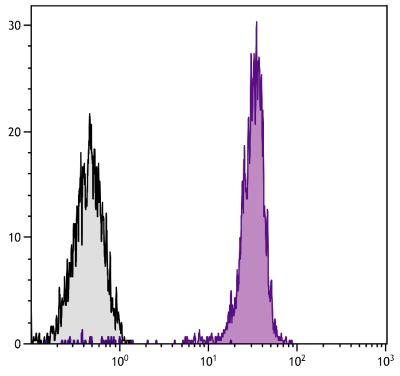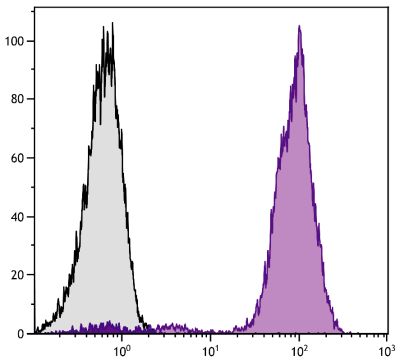Mouse Anti-Chicken CD3-APC (CT-3)
Cat. No.:
8200-11
APC Anti-Chicken CD3 antibody for use in flow cytometry assays.
$376.00
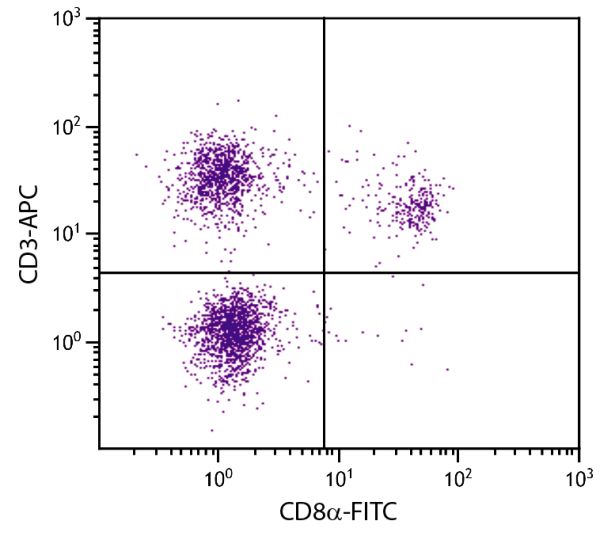

| Clone | CT-3 |
|---|---|
| Isotype | Mouse (BALB/c) IgG1κ |
| Isotype Control | Mouse IgG1-APC (15H6) |
| Specificity | Chicken/Pigeon CD3 |
| Alternative Names | T3/TCR complex |
| Description | CD3 is a member of the T cell receptor-associated CD3 complex. The monoclonal antibody CT-3 recognizes a complex of at least three polypeptides of Mr 20, 19, and 17 kDa (two of which are N-glycosylated) on chicken T cells. The antibody also coprecipitates a polypeptide of 90 kDa from digitonin solubilized T cell lysates, which can be reduced to two polypeptides of Mr 50 and 40 kDa. |
| Immunogen | Chicken thymocytes and Ig- blood mononuclear cells |
| Conjugate | APC (Allophycocyanin) |
| Buffer Formulation | Phosphate buffered saline containing < 0.1% sodium azide and a stabilizer |
| Clonality | Monoclonal |
| Concentration | 0.1 mg/mL |
| Volume | 1.0 mL |
| Recommended Storage | 2-8°C; Avoid exposure to light; Do not freeze |
| Applications |
Flow Cytometry – Quality tested 1,5,10-18 Immunohistochemistry-Frozen Sections – Reported in literature 2-8 Immunohistochemistry-Paraffin Sections – Reported in literature 9 Immunoprecipitation – Reported in literature 1 Stimulation – Reported in literature 1 |
| RRID Number | AB_2796421 |
| Gene ID |
396062 (Chicken) 102092091 (Pigeon) |
| Gene ID Symbol |
CD3E (Chicken) CD3E (Pigeon) |
| UniProt ID |
Q98910 (Chicken |
| UniProt Name |
CD3E_CHICK (Chicken) |
Documentation
Certificate of Analysis Lookup
Enter the Catalog Number and Lot Number for the Certificate of Analysis you wish to view
- 1. Chen CH, Ager LL, Gartland GL, Cooper MD. Identification of a T3/T cell receptor complex in chickens. J Exp Med. 1986;164:375-80. (Immunogen, FC, IP, Stim)
- 2. Njenga MK, Dangler CA. Endothelial MHC class II antigen expression and endarteritis associated with Marek's disease virus infection in chickens. Vet Pathol. 1995;32:403-11. (IHC-FS)
- 3. Tanimura N, Sharma JM. Appearance of T cells in the bursa of Fabricius and cecal tonsils during the acute phase of infectious bursal disease virus infection in chickens. Avian Dis. 1997;41:638-45. (IHC-FS)
- 4. Zheng W, Yoshimura Y. Organ-specificity of estrogen effects on the induction of immunocompetent cells in the chicken. J Poult Sci. 2001;38:41-9. (IHC-FS)
- 5. Sheela RR, Babu U, Mu J, Elankumaran S, Bautista DA, Raybourne RB, et al. Immune responses against Salmonella enterica serovar enteritidis infection in virally immunosuppressed chickens. Clin Diagn Lab Immunol. 2003;10:670-9. (FC, IHC-FS)
- 6. Pantin-Jackwood MJ, Brown TP, Huff GR. Proventriculitis in broiler chickens: immunohistochemical characterization of the lymphocytes infiltrating the proventricular glands. Vet Pathol. 2004;41:641-8. (IHC-FS)
- 7. Hansell C, Zhu XW, Brooks H, Sheppard M, Withanage S, Maskell D, et al. Unique features and distribution of the chicken CD83+ cell. J Immunol. 2007;179:5117-25. (IHC-FS)
- 8. Schusser B, Collarini EJ, Yi H, Izquierdo SM, Fesler J, Pedersen D, et al. Immunoglobulin knockout chickens via efficient homologous recombination in primordial germ cells. Proc Natl Acad Sci USA. 2013;110:20170-5. (IHC-FS)
- 9. Solcan C, Solcan G, Cotea C. Immunotoxic action of ochratoxine A on lymphocytes from lymphoid tissues associated to gut mucosa in chickens. Bulletin UASVM Agriculture. 2010;67:283-90. (IHC-PS)
- 10. Koskinen R, Göbel TW, Tregaskes CA, Young JR, Vainio O. The structure of avian CD5 implies a conserved function. J Immunol. 1998;160:4943-50. (FC)
- 11. Conrad ML, Davis WC, Koop BF. TCR and CD3 antibody cross-reactivity in 44 species. Cytometry. 2007;71A:925-33. (FC)
- 12. Janardhana V, Broadway MM, Bruce MP, Lowenthal JW, Geier MS, Hughes RJ, et al. Prebiotics modulate immune responses in the gut-associated lymphoid tissue of chickens. J Nutr. 2009;139:1404-9. (FC)
- 13. Xue M, Shi X, Zhao Y, Cui H, Hu S, Cui X, et al. Effects of reticuloendotheliosis virus infection on cytokine production in SPF chickens. PLoS One. 2013;8(12):e83918. (FC)
- 14. Peng X, Zhang K, Bai S, Ding X, Zeng Q, Yang J, et al. Histological lesions, cell cycle arrest, apoptosis and T cell subsets changes of spleen in chicken fed aflatoxin-contaminated corn. Int J Environ Res Public Health. 2014;11:8567-80. (FC)
- 15. Vu Manh T, Marty H, Sibille P, Le Vern Y, Kaspers B, Dalod M, et al. Existence of conventional dendritic cells in Gallus gallus revealed by comparative gene expression profiling. J Immunol. 2014;192:4510-7. (FC)
- 16. Pleidrup J, Dalgaard TS, Norup LR, Permin A, Schou TW, Skovgaard K, et al. Ascaridia galli infection influences the development of both humoral and cell-mediated immunity after Newcastle Disease vaccination in chickens. Vaccine. 2014;32:383-92. (FC)
- 17. Laniewski P, Kuczkowski M, Chrząstek K, Woźniak A, Wyszyńska A, Wieliczko A, et al. Evaluation of the immunogenicity of Campylobacter jejuni CjaA protein delivered by Salmonella enterica sv. Typhimurium strain with regulated delayed attenuation in chickens. World J Microbiol Biotechnol. 2014;30:281-92. (FC)
- 18. Dudek K, Bednarek D. Cellular immune response of pigeons in the conditions of endotoxin fever and pyrogenic tolerance. Pol J Vet Sci. 2011;14:127-33. (FC, Pigeon Reactivity)
See All References


